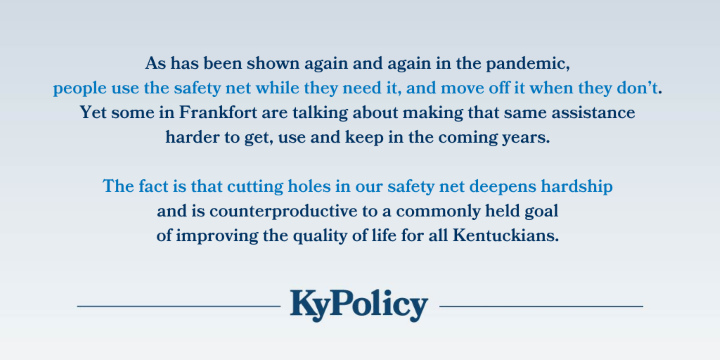The past two years have been hard on Kentuckians. In April 2020, nearly 1 in 7 lost their job and many more Kentuckians lost hours at work or faced quarantines instead of taking shifts. While conditions have improved, thousands still find it difficult to make ends meet amid ongoing new waves of COVID.
And let’s face it, even before 2020, our economy didn’t work for everyone, especially those who face inequities because of their race or gender or where they are from. When folks confront economically challenging circumstances like living in a depressed economy, or when they fall on hard times from a pandemic, a tornado, the headwinds of a felony record or just bad luck, our safety net is designed to catch them, and help get them on their feet.
The safety net — which is what we call things like food assistance, utility assistance, Medicaid, jobless benefits, child care assistance and similar programs — has a wide reach that helps people in all stages of life. It is a powerful, interwoven set of supports that reaches hundreds of thousands of kids, underpaid workers and the elderly every day throughout the commonwealth. At the same time, the safety net empowers local economies as people buy groceries, see a doctor, send their kids to daycare, pay their rents or just get through the end of a month. In a way, the safety net is what we’re about as Kentuckians: looking out for each other.
While our safety net has been around for a long time, its value has really come into focus during the COVID-19 pandemic. Despite so many Kentuckians losing health, pay and economic stability, the safety net and other forms of COVID relief kept over 700,000 Kentuckians out of poverty last year. This reality for Kentucky families has meant they could feed their kids, get care for serious health conditions and keep the heat on during many cold nights.
As has been shown again and again in the pandemic, people use the safety net while they need it, and move off it when they don’t. Yet some in Frankfort are talking about making that same assistance harder to get, use and keep in the coming years. Despite decades of evidence that erecting barriers to public assistance harms people and fails to achieve their stated purposes, ideas are circulating again that would cut off jobless benefits early among laid-off Kentuckians, make food assistance harder to use in the checkout line and treat Kentuckians in need as likely criminals.
The fact is that cutting holes in our safety net deepens hardship and is counter-productive to a commonly held goal of improving the quality of life for all Kentuckians.
We know what it takes to have a strong safety net that supports Kentuckians striving toward a good life for themselves, their families and their communities. We need to treat Kentuckians seeking assistance with dignity and respect and without stigma, rolling out a proverbial welcome mat rather than closing a locked door. We should take down barriers to the safety net by making the rules clear and the application process simple, and we should ensure needed help isn’t left on the table.
That’s how we’ll get a strong start for kids, a chance at something better for underpaid workers, relief for struggling parents and sustenance for the elderly. Decades of research has shown how Medicaid improves health and financial stability, food assistance reduces hunger and is linked to improved graduation rates for kids, quality child care creates lasting, holistic benefits for children, and recent evidence has even shown how sending underpaid moms a check every month helps their baby’s brain development before they’re even born. As a community that truly cares about each other, policies should move in the evidence-based direction of more support, not less.
The COVID-19 pandemic should provide a lasting lesson about the importance of an adequate safety net to our communities and economy. In a time of many challenges, we should brace for the next one by working together to make the safety net stronger.
This column appeared in the Northern Kentucky Tribune on Jan. 30, the State Journal on Feb. 3, and the Courier-Journal on Feb. 4, 2022.




